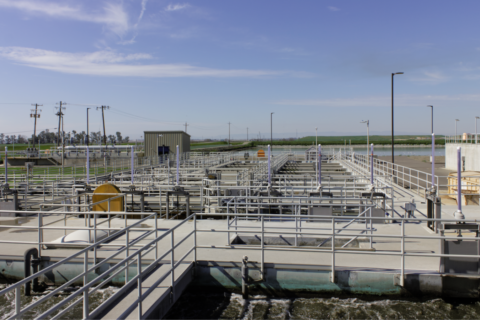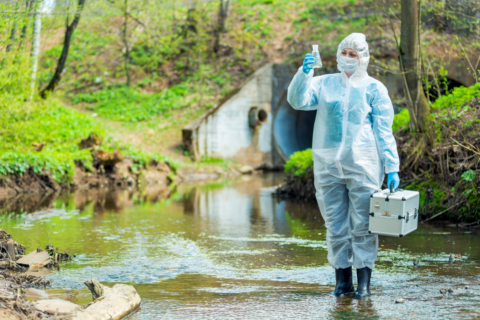The Bipartisan Infrastructure Law (BIL), officially known as the Infrastructure Investment and Jobs Act, provides significant funding for improving the nation’s drinking water, wastewater and stormwater infrastructure. The law delivers $50 billion to the U.S. Environmental Protection Agency (EPA), mostly to the State Revolving Fund (SRF) programs, which goes out to communities from state agencies as a mix of loans and grants or principal forgiveness.
While this is the single largest investment in water that the federal government has ever made, it is not enough to close the water infrastructure investment needs gap. EPA estimates the nation’s water infrastructure capital needs over the next 20 years to be approximately $896 billion in total.1 Moreover, local governments are responsible for 98 percent of all water infrastructure capital, operations and maintenance investments, including investing over $148 billion in 2021 alone, according the U.S. Census Bureau.
While the NLC Rebuilding America dashboard showcases the cities, towns and villages that have successfully received direct federal grants from BIL, local government State Revolving Fund recipients are not included because those applications run through the state. Each state has its own timeline, processes and affordability criteria for project selection and providing financing or funding to local governments.
EPA’s memorandum to state agencies provides guidance on how funds should be dispersed to communities and highlights the flexibility provided to states and communities to address a wide variety of local water quality and public health challenges. Here is a look at some of the cities, towns and villages that have received funding through their state through the SRFs to improve their local water systems. Important for local leaders, the annual allocation of BIL funding will ramp up in years three through five (FY24-26) for the Clean Water and Drinking Water State Revolving Funds.

Clean Water State Revolving Fund
The Clean Water State Revolving Fund provides financing and funding to communities for a wide range of water quality projects to help meet the requirements of the Clean Water Act, including improving municipal wastewater facilities, nonpoint source pollution control, decentralized wastewater treatment systems, stormwater runoff mitigation, green infrastructure, estuary protection and water reuse.
Chattanooga, TN
In October 2023, the State of Tennessee approved a $20 million low-interest loan from the Tennessee Clean Water State Revolving Fund to the City of Chattanooga for a $48.47 million project to address sewer overflows and infiltration. This stormwater project will provide 5 million gallons in extra storage, which will allow the city to better manage stormwater and wastewater during heavy rainfall. In Tennessee, a changing climate will lead to increased flooding due to precipitation. The project will support the overall resilience of the city to a changing climate by holding stormwater and wastewater and then releasing it back into the system once flow has subsided, typically within 48 hours. In addition to local and SRF funding, the city will also be using ARPA dollars to complete the project.
Drinking Water State Revolving Fund
The Drinking Water State Revolving Fund is a financial assistance program to help communities achieve the health protection objectives of the Safe Drinking Water Act. Eligible uses include improving drinking water treatment, improving water transmission and distribution, improving and protecting source water supply, replacing or constructing finished water storage tanks, and other infrastructure projects needed to protect public health.
Framingham, MA
The Massachusetts Clean Water Trust and Department of Environmental Protection announced in October 2023 that $115.2 million in grants were awarded for 47 projects in 40 municipalities and water utilities across the Commonwealth. One of the municipalities funded is Framingham, MA which will utilize the funding to conduct a lead line inventory and develop a replacement plan. Learn more.
Drinking Water State Revolving Fund – Lead Service Line Replacement
The BIL contains $15 billion over five years in dedicated funding through the Drinking Water SRF for lead service line identification and replacement. Any project funded under this appropriation must replace the entire lead service line, not just a portion, unless a portion has already been replaced.
Bessemer, MI
Michigan is funding $933 million to communities utilizing Drinking Water SRF funds. The City of Bessemer, with a population of approximately 1800, received a loan for water main and lead service line replacements and other infrastructure improvements. Explore other drinking water state revolving fund projects in Michigan utilizing an interactive funding and financing dashboard.
Clean Water and Drinking Water State Revolving Funds – Address PFAS Emerging Contaminants
The BIL provides $10 billion over five years through both the Clean Water and Drinking Water State Revolving Funds and direct grants to communities for addressing PFAS contamination and other emerging contaminants. Of all of the SRF funding from BIL, these funds are the only portion that will go out to communities as 100 percent grants or principal forgiveness, rather than a combination with loans.
Wausau, WI
The City of Wausau, WI is receiving over $17 million in Emerging Contaminant funding. From that, $5.1 million is principal forgiveness, and the remaining $12.3 million will be available at a subsidized interest rate. This funding will be utilized to bring numerous benefits to the community, including reducing the concentration of PFAS in drinking water. Learn more about this project and other Wisconsin projects here.
Resources and Technical Assistance Opportunities
Local leaders can review the status of each of the SRF funding pots and whether the funds have been awarded by EPA to the states. Local leaders can contact their state agencies for information on how to apply for the Clean Water SRF and the Drinking Water SRF.
EPA is supporting a number of technical assistance programs to support communities in accessing SRF funds and project development. Through the Environmental Finance Centers, EPA and partners will help underserved communities that have historically struggled to access federal funding receive the support they need to access resources for water infrastructure improvements. At this time, the Southwest Environmental Finance Center is accepting requests for assistance from communities in EPA Region 6, which covers New Mexico, Oklahoma, Texas, Arkansas and Louisiana.
Last week, the EPA announced the new Get the Lead Out (GLO) Initiative. Through the GLO initiative, which is funded entirely by the Bipartisan Infrastructure Law and is in partnership with the Department of Labor, EPA will partner with 200 underserved communities nationwide to provide the technical assistance they need to identify and remove lead service lines. GLO will specifically help participating communities identify lead services lines, develop replacement plans and apply for funding to get the lead out. Communities seeking to access GLO Initiative resources can request assistance by completing the WaterTA request form.
Finally, EPA’s Water Technical Assistance Page includes a one-stop-shop for technical assistance. Through the water technical assistance request form, communities can request no-cost direct technical assistance to evaluate their drinking water, wastewater, stormwater infrastructure and water quality improvement needs. The page also includes specific examples of what types of assistance are available and who is eligible. See also the Water Technical Assistance Fact Sheet and list of Water Technical Assistance programs.










